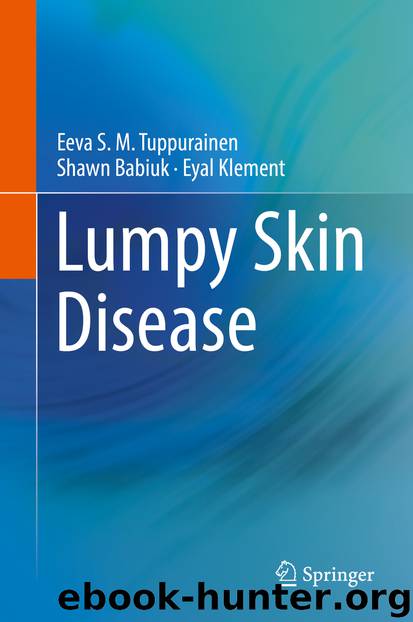Lumpy Skin Disease by Eeva S. M. Tuppurainen Shawn Babiuk & Eyal Klement

Author:Eeva S. M. Tuppurainen, Shawn Babiuk & Eyal Klement
Language: eng
Format: epub
Publisher: Springer International Publishing, Cham
13.6 Seasonality
The occurrence of LSD outbreaks is characterized by marked seasonality both in tropical and temperate regions. Usually it is associated with periods of high rainfall accompanied by warm temperatures and a resultant high insect activity (Hunter and Wallace 2001). Studies in Ethiopia reported three peaks of the disease, the highest occurred during August and two additional peaks were observed in May and December (Hailu et al. 2014), and an opposing results of highest incidence between September and December, and the lowest incidence in May (Ayelet et al. 2014) . In Turkey, seasonality was also observed, with two high peaks of the outbreaks during September and November and a smaller peak during March (Sevik and Dogan 2016). In Israel the highest peak was observed during April, followed by smaller peaks in August and December (Kahana-Sutin et al. 2016). In this study the authors also differentiated between peaks of the disease during the dry summer months, which occurred mostly in grazing beef herds and the peaks in the beginning of the winter and in the spring which occurred mostly in dairy herds, parallel to a rise of the stable fly population. In all of the above-mentioned countries, LSD occurred all over the year despite the seasonal changes in disease incidence. In the Balkans, probably due to the lower temperatures during the winter, the disease was absent during January to March and peaked during the summer months (Mercier et al. 2017).
Download
This site does not store any files on its server. We only index and link to content provided by other sites. Please contact the content providers to delete copyright contents if any and email us, we'll remove relevant links or contents immediately.
Sapiens: A Brief History of Humankind by Yuval Noah Harari(14368)
The Tidewater Tales by John Barth(12652)
Mastermind: How to Think Like Sherlock Holmes by Maria Konnikova(7323)
Do No Harm Stories of Life, Death and Brain Surgery by Henry Marsh(6938)
The Thirst by Nesbo Jo(6932)
Why We Sleep: Unlocking the Power of Sleep and Dreams by Matthew Walker(6706)
Life 3.0: Being Human in the Age of Artificial Intelligence by Tegmark Max(5548)
Sapiens by Yuval Noah Harari(5366)
The Body: A Guide for Occupants by Bill Bryson(5082)
The Longevity Diet by Valter Longo(5058)
The Rules Do Not Apply by Ariel Levy(4957)
The Immortal Life of Henrietta Lacks by Rebecca Skloot(4577)
Animal Frequency by Melissa Alvarez(4461)
Why We Sleep by Matthew Walker(4434)
The Hacking of the American Mind by Robert H. Lustig(4375)
Yoga Anatomy by Kaminoff Leslie(4358)
All Creatures Great and Small by James Herriot(4311)
Double Down (Diary of a Wimpy Kid Book 11) by Jeff Kinney(4261)
Embedded Programming with Modern C++ Cookbook by Igor Viarheichyk(4173)
